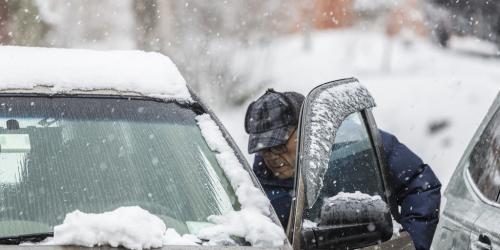The holidays are soon approaching, and for many of us, this will mean a welcome visit from our senior parents or grandparents. You may be concerned for their safety while driving long distances on the winter roads or in poor weather conditions. Statistics report that people 70 years of age and older have the second-highest accident rate per kilometer as compared to other age groups. Only young male drivers have a higher accident rate.
Driving concerns for seniors include:
- Delayed reaction time – a 65-year-old has a reaction time 22 times slower than a 30-year-old;
- Impaired eyesight – vision problems such as cataracts, glaucoma and macular degeneration, can make it difficult to see clearly or drive at night, and may give rise to difficulties with depth perception;
- Age-related hearing loss – for example, reduced ability to hear a car honk or an approaching emergency vehicle or train can become issues;
- Growing forgetfulness;
- Range of motion issues such as shoulder checking and moving hands and feet.
In Alberta, a regulation requires drivers, 75 years of age and older, to file a medical report (signed by a physician) and a visual screening examination report with the Registrar of Motor Vehicle Services for license renewals. All drivers, regardless of age, are legally required to report any medical conditions that may affect their ability to drive safely.
Tips for friends and relatives of older drivers to help ensure that they arrive for the holidays safely:
- Make sure they are scheduling regular vision and hearing tests;
- Ask how they are managing any chronic conditions, such as diabetes or seizures;
- Help them to monitor medications to assess whether they require driving restrictions and make sure that they are not driving after taking medication that causes drowsiness or dizziness;
- Assess whether they have any physical limitations – for example, do they need power steering, an automatic transmission vehicle, power brakes or a vehicle with larger, easier to read dials on the dashboard? Do they need a newer model of vehicle with safety features that can help avoid collisions, such as rear-view cameras and aids to assist in changing lanes safely, managing blind spots, etc.?;
- Make sure they stay within their comfort zone, perhaps driving only in the daytime, not in rush hour, in good weather conditions, on quiet roads, and in familiar areas, staying off freeways, highways, and finding safer familiar routes instead;
- Make sure they do not drive when tired, stressed or upset, and never let them (or anyone) drive while impaired with alcohol or drugs;
- Ensure they will not be driving distracted, by cell phones or animated conversation within the vehicle, by the radio or by eating;
- Help ensure they have planned their route well ahead of time and takes advantage of any GPS system within the vehicle;
- Remind them to use the right lane – to avoid aggressive drivers;
- A good night sleep before a long road trip is important. Remind them to stop for refreshments every hour or two, and not to drive too many hours in the day;
- Remind them to increase their following distance to give themselves more reaction time, especially on winter roads.
Arriving safe and sound for the holidays is the number one priority, and by reminding our loved ones to take precaution, we minimize the risk on the roads for all.
In the event the worst should happen, please CONTACT the friendly, helpful and knowledgeable lawyers at CAM LLP for a free consultation.

